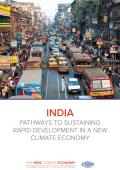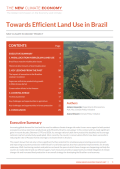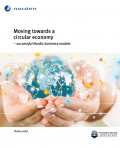

Increasing global demand for food and the need to address climate change risk make it ever more urgent to both protect ecosystems and use land more productively and efficiently. Brazil is a key player in this context and has made significant gains in recent decades. Between 1970 and 2006, its average national cattle farm productivity doubled and its average national crop farm productivity quadrupled. More recently, the country’s conservation efforts have been successful in reducing the rate of Amazon forest clearings to its lowest level in 30 years.
This report shows that not only is there significant further potential for simultaneously promoting economic growth and improving ecosystem protection within Brazil’s rural landscape but also that substantial improvements are already underway. Well-functioning markets and policies can boost the pace at which these changes are happening and help the country to realize latent land use efficiency gains. Such measures provide an opportunity to embed mitigation of climate change risk and increased food production in an overall strategy for developing the Brazilian rural economy.

Moving towards a ‘Circular Economy’ is an action that many world business leaders, policy makers, academics and NGOs argue is necessary in order to help solve global environmental and economic challenges. This report summarizes the findings of a project initiated by the Nordic Waste Prevention Group under the Nordic Council of Ministers to make the circular economy thinking more mainstream in the Nordic countries and thereby accelerate the development of circular economy in the Nordic region. In addition to this report, the project also included the organisation of a large multi-stakeholder workshop with participation of more than 60 actors relevant for the circular economy, which was held in in Copenhagen in April 2015.
In this report, there are 18 case examples of Nordic businesses which are part of the Nordic circular economy as well as short policy recommendations, which were suggested at the workshop.
This report addresses investment in sustainable urban infrastructure and provides an overview of financial instruments that are commonly used to finance infrastructure development. It analyses their potential to support the transition towards sustainable infrastructure, with a primary focus on energy efficiency and renewable energy at city level. Cities are faced with the huge challenge of providing infrastructure that meets the needs of a rising urban population with limited public resources. Cities already account for over 70% of global greenhouse gas emissions and energy consumption and face rising climate change-related risks. The way cities develop, particularly large and fast-growing cities in developing and emerging economies, is likely to have profound and long-term implications for both climate change and the global economy. Decisions and investments in urban infrastructure must be leveraged to achieve sustainable economic growth within the carrying capacity of the planet’s systems and resources.
Green development emphasizes co-development between economic and environmental dimensions, and is a people-centered sustainable development approach. Western China demands green development, and international experience could provide necessary, unique and important help and support for Western China to achieve its green development goals. This paper has made a comprehensive overall review and analysis of international experience in green development policy and its implementation, in particular, OECD countries’ (mostly Australia and Canada) experience have been analyzed following the major policy foci defined by the Task Force on Strategy and Policies on Environment and Development in Western China initiated by China Council for International Cooperation on Environment and Development (CCICED). Data and information were gathered from the field surveys and investigations, expert meetings, as well as literature review. The main sections include policy framework and road map establishment, implementation and performance assessment, co-development between economic development and environmental protection, as well as green employment and poverty alleviation.
